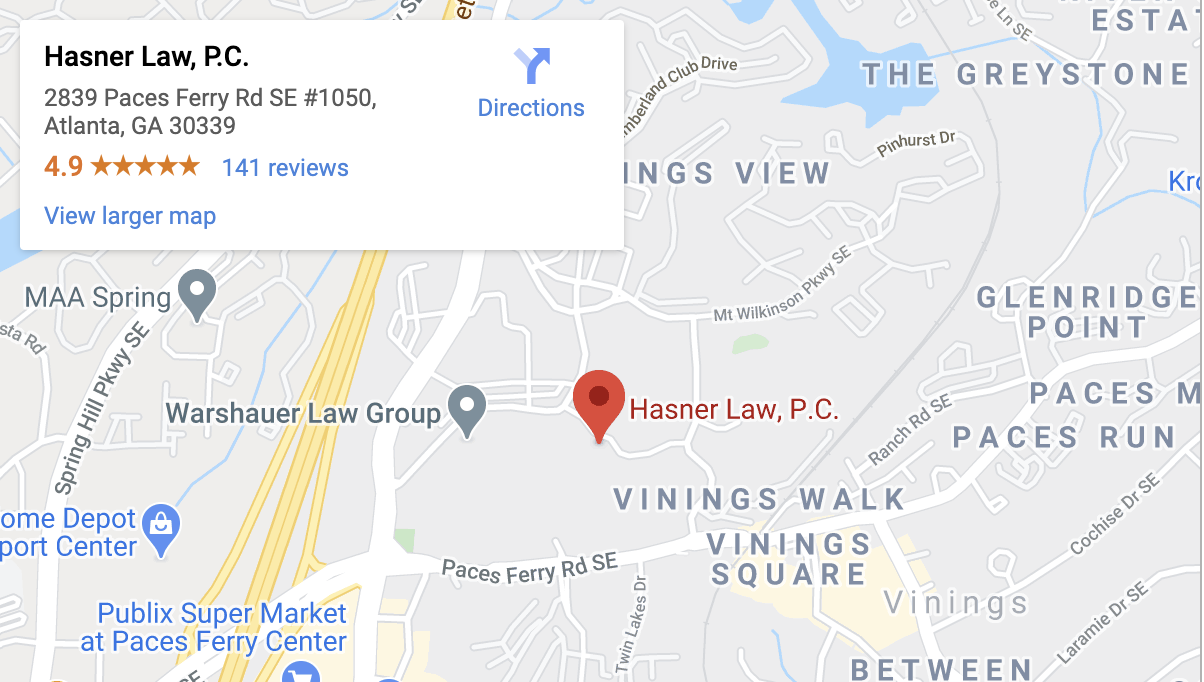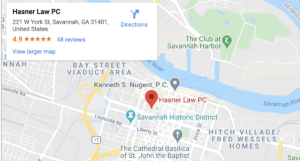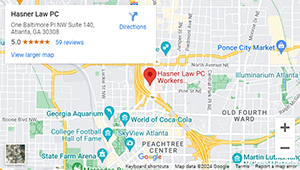Atlanta Nerve Damage Lawyer

Have you sustained nerve damage in an accident in Atlanta, GA? If someone else’s negligent conduct was to blame, you could be entitled to compensation for medical bills, lost wages, pain and suffering, and more. An Atlanta nerve damage lawyer at Hasner Law Injury & Workers’ Compensation Attorneys can fight to help you recover the full compensation you deserve.
Collectively, our attorneys have more than 80 years of experience helping injured clients like you. To date, we’ve used our skills to recover more than $100 million in compensation for accident victims across Atlanta, Georgia.
Interested in learning more about our practice areas? Contact our law firm in Atlanta at 678-888-4878 to schedule a free case evaluation today.
How Hasner Law Injury & Workers’ Compensation Attorneys Can Help After Suffering Nerve Damage in Atlanta

It can take time to fully understand the long-term consequences of serious nerve damage. That doesn’t make the consequences any less dramatic. When you’re dealing with pain and limitations on a daily basis, you deserve to be compensated.
Unfortunately, the insurance company will do everything in their power to limit the amount you receive. They’ll argue that the damage isn’t as severe as you claim. They might even try to blame you for getting hurt.
An Atlanta personal injury lawyer at Hasner Law Injury & Workers’ Compensation Attorneys can help you seek compensation for your injury by:
- Hiring experts in medicine, rehabilitation, and life planning to strengthen your claim
- Investigating to pinpoint the cause of the damage
- Negotiating with the insurance companies to reach a fair settlement
Our Atlanta personal injury attorneys aren’t afraid to take your case to court if the insurance company refuses to offer a fair settlement. If you’re interested in learning more about how our team can put more than 80 years of experience to work for you, call our law offices in Atlanta, GA, today.
Overview of Nerve Damage Injuries

t’s estimated that about 20 million Americans suffer from some form of nerve damage. While nerve damage is often “secondary” to other types of injury, nerve damage can actually impact your life far after your “primary” injuries have healed.
The nerves in your body are responsible for a number of critical functions–including control over motor function, sensation, and automatic bodily functions.
There are three primary types of nerves in the human body, including:
- Autonomic nerves, which regulate involuntary bodily functions–or bodily processes that occur on their own, such as blood pressure, heart rate, digestion, and body temperature
- Sensory nerves, which control sensation by sending messages throughout the body, helping us feel sensation like heat, pain, and touch
- Motor nerves, which communicate with the brain and allow us to control conscious motor function by relaying messages to the muscles via the spinal cord
Damage to any one of those nerves can cause a lifetime of pain and suffering. Severe nerve damage can even interfere with your ability to live a normal life.
Types of Nerve Damage
Nerves are present throughout the entire body, often right beneath the surface of the skin. Because of this, there’s always a risk that the nerves could be damaged in an accident.
There are three primary forms of nerve damage, which is also called neuropathy.
Those include:
- Mononeuropathy, where a single nerve is damaged (for example, a herniated disc might compress only a single nerve)
- Polyneuropathy, where a group or bundle of nerves is damaged–so that multiple areas of the body are impacted
- Neuritis, where inflammation impacts (or compresses) a nerve
The severity of the damage will usually depend upon the location of the nerves and the number of nerves impacted.
What are the Signs and Symptoms of Nerve Damage?
The initial signs and symptoms of nerve damage will depend upon which nerves were impacted. Sometimes, a single accident can impact more than one type of nerve–and some of the common signs and symptoms overlap.
In general, you might be suffering from sensory nerve damage if you’re experiencing:
- Numbness or tingling in the hands or feet
- Sensitivity
- Burning
- Throbbing pain
- Sharp pain
- Problems with balance or walking
Signals that the motor nerves have been damaged might include:
- Muscle weakness
- Muscle atrophy
- Uncontrollable twitching
- Painful cramps
- Paralysis
Signs of autonomic nerve injuries include:
- A dramatic drop in blood pressure
- Lightheadedness
- Excessive sweating or reduced ability to sweat
- Dry eyes and mouth
- Constipation
In some cases, nerve damage can be reversed or treated–especially if it’s caught quickly. If you were involved in an accident, seek medical attention as soon as possible.
What are the Long-Term Consequences of Nerve Damage?
Nerve damage impacts your body’s ability to communicate with the brain and spinal cord. While some types of nerve damage can be treated or reversed, nerve damage can also lead to permanent, long-term consequences
Some of the long-term consequences of nerve damage include:
- Chronic pain
- Sores on the feet that do not heal (due to numbness)
- Amputation
- Permanent loss of sensation
- Paralysis
- Inability to control motor function
- Sexual dysfunction
- Bladder dysfunction
- Wrongful death, especially when the autonomic nerves are damaged
Chronic pain is a problem for many nerve damage victims. A severed nerve can permanently limit your ability to control bodily functions.
What Causes Nerve Damage?
Some types of nerve damage are caused by chronic diseases, like diabetes or lupus. Even chemotherapy has the potential to cause neuropathy.
However, any type of physical trauma or accident can cause nerve damage. Nerve damage can happen when a nerve becomes pinched, scraped, or is cut or severed. It can also happen over time, as a secondary consequence of another injury that puts pressure on the nerve.
Nerve damage is much more common in certain areas of the body, including:
- The lower back
- The middle back
- Hands
- Feet
- Neck
Whiplash in car accidents can involve damage to the nerves. In most accident cases, nerve damage accompanies injury to another body part.
Some of the most common causes of nerve damage in Atlanta include:
- Car accidents
- Slip and fall accidents
- Motorcycle accidents
- Pedestrian accidents
- Bicycle accidents
- Truck accidents
- Bus accidents
- Construction accidents
- Workplace accidents
- Dog bites
- Defective products
- Medical malpractice
Injuries to the neck and back can all lead to pinched nerves. Traumatic amputations can also cause a type of nerve pain known as phantom pain, which happens when the nerves and muscles are severed.
What is My Atlanta Nerve Damage Case Worth?
The value of a nerve damage case is usually highest when the damage is permanent and severe.
While it’s impossible to accurately value your claim without learning the facts, the following factors are important:
- Your age and future earning potential
- Whether you can work, both while you recover and in the future
- The cost of your medical treatment and rehabilitation
- The impact of the injury on your day-to-day activities
- The mental, emotional, and psychological impact of the injury
At Hasner Law Injury & Workers’ Compensation Attorneys, we can help you understand what your personal injury case is worth from the beginning. Give us a call today to learn more.
What Compensation Can I Recover for Nerve Damage in Atlanta, Georgia?
Nerve damage can impact every aspect of your life. You may be unable to work while you deal with chronic pain or even paralysis.
You deserve to be fully compensated for your losses if someone else’s actions caused the injury. Accident victims can recover two primary types of damages in a personal injury lawsuit: economic damages and non-economic damages.
Economic damages in Georgia include compensation for:
- Past medical expenses
- Future medical procedures
- Lost wages
- Future medical bills
- Lost future earning potential
- Rehabilitation
- Pain management therapies
- All past and future out-of-pocket expenses caused by the injury
Non-economic damages in Georgia are more difficult to value but no less important to your settlement.
They include compensation for:
- Pain and suffering
- Mental anguish
- Diminished quality of life
- Disfigurement and scarring
- Loss of consortium and damage to relationships
Our Atlanta nerve damage attorneys can help you fight for every dollar you deserve. Call Hasner Law Injury & Workers’ Compensation Attorneys to schedule a free case review today.
How Long Do I Have to File a Lawsuit Based on Nerve Damage in Georgia?
Understanding the statute of limitations in a personal injury case is critical. The statute of limitations imposes a time limit on your right to sue for damages. Once the deadline passes, you lose your right to compensation.
Under Georgia state law, accident victims have only two years to file a personal injury lawsuit. The two-year limit applies if you were hurt in a car accident, motorcycle wreck, or slip and fall, for example. It means you have to file your lawsuit before the two-year anniversary of the accident.
When nerve damage is caused by a medical error, you might have more time to file a medical malpractice claim. In medical malpractice cases, victims have up to five years to sue for damages based on when they discovered the injury. The five-year period applies when the victim didn’t learn about the medical mistake within the two-year period.
Contact an Atlanta Nerve Damage Lawyer for a Free Consultation
There’s never a convenient time to deal with the aftermath of a serious injury. If you suffered nerve damage due to the negligence of someone else, an experienced Atlanta nerve damage lawyer at Hasner Law Injury & Workers’ Compensation Attorneys can help. Call or use our online contact form to schedule a free initial consultation today.






